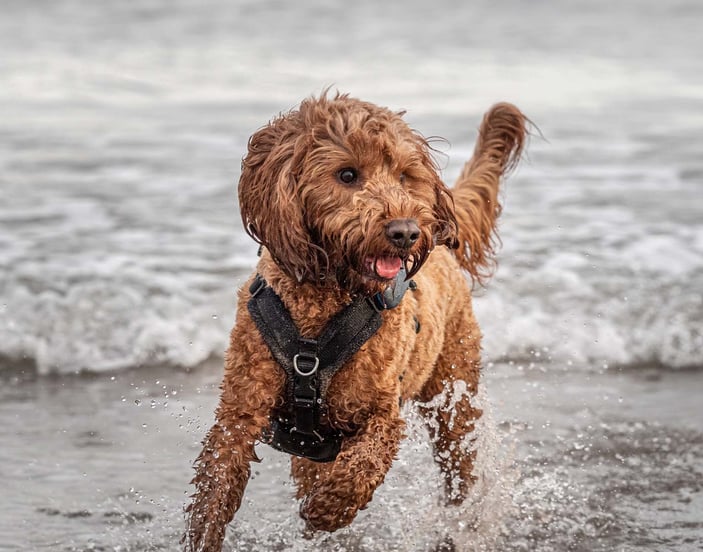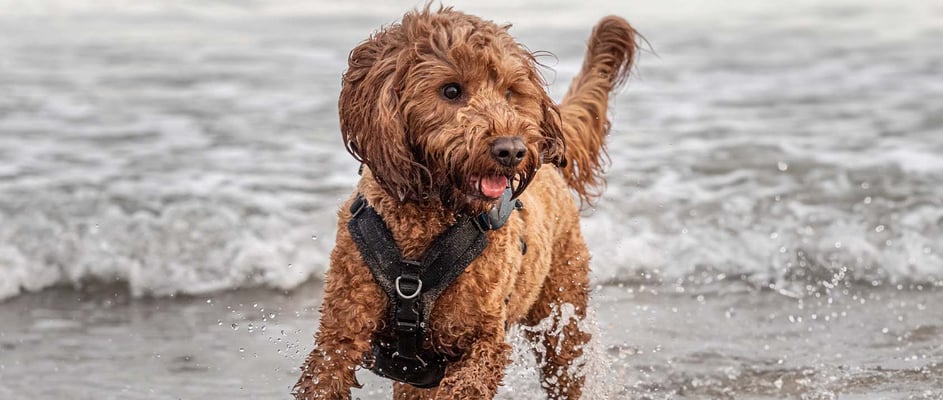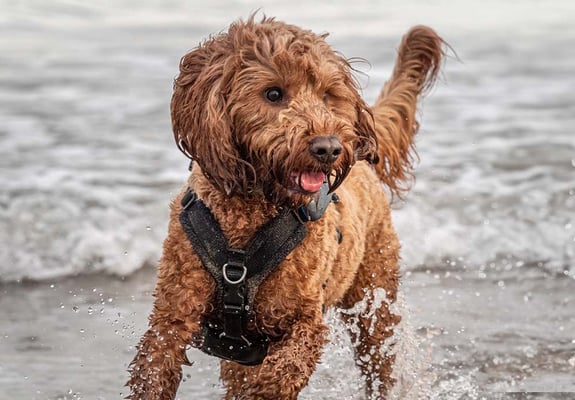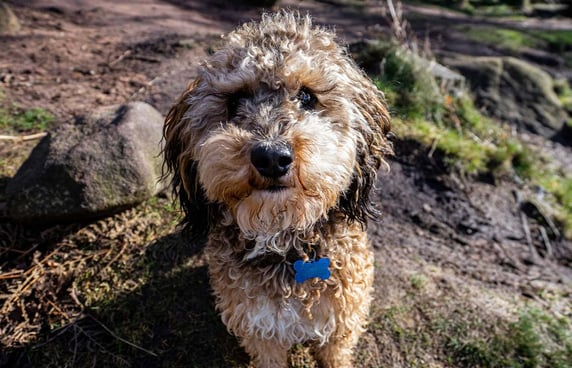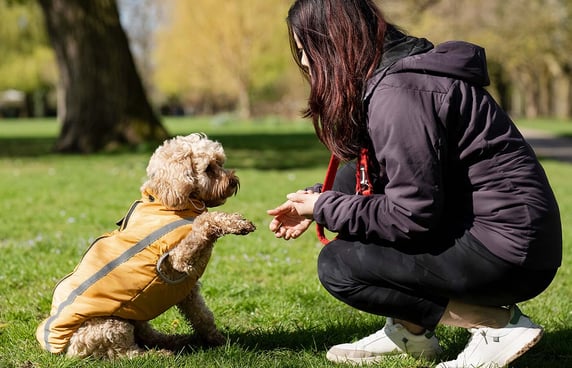The guide to owning a Cockapoo.
Want to know everything there is to know about finding the right dog for you? Submit your email below, and we’ll send you a one-stop guide to help you on your pet-ownership journey.
Jump to:
Stats at a glance
A history of Cockapoos
The Cockapoo is one of the oldest and most established crossbreeds in the world. The breed originated in the United States during the 1960s and was created as a non-shedding, active and intelligent companion dog that required less coat care than other breeds of similar size.
Cockapoos are a cross between a Cocker Spaniel and a Poodle and are considered a ‘designer breed’ because they inherit traits such as intelligence, playfulness and friendliness from both parent breeds. They tend to thrive on social interaction and may develop separation anxiety if left alone for extended periods.
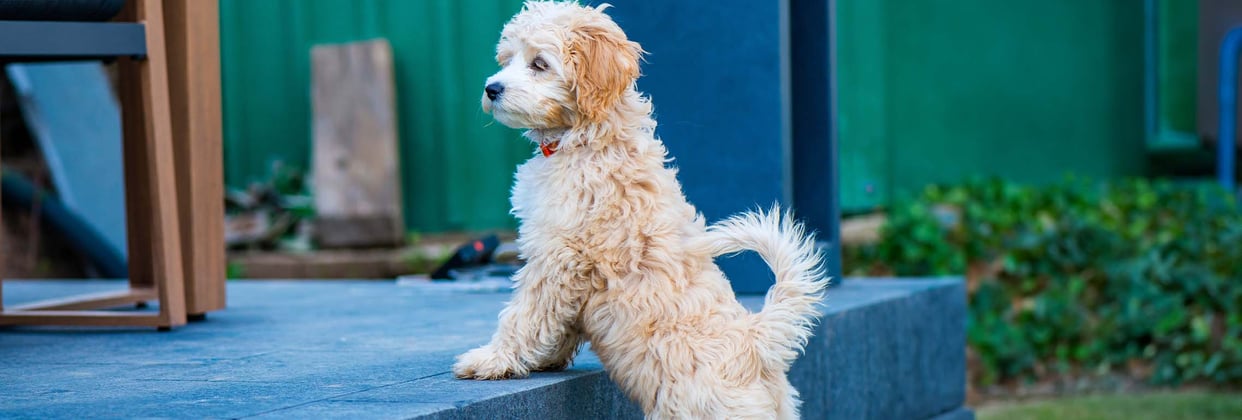

Cockapoos are often described as an accidental discovery in the world of dog breeding. Due to the unpredictable nature of crossbreeding, the first Cockapoos were not intentionally planned by the breeder but rather emerged as a happy accident. Despite their accidental beginnings, Cockapoos became one of the earliest and most successful examples of designer dogs, capturing the hearts of many dog lovers with their affectionate nature and playful demeanour.
Today, Cockapoos remain a beloved and popular hybrid breed known for their versatility, adaptability and unwavering loyalty to their owners. They’re often one of the first breeds new dog owners consider because of the positive character traits inherited from their purebred parents.
How much is a Cockapoo puppy (UK)?
The average cost of a Cockapoo puppy in the UK is likely to vary depending on factors such as the parent’s pedigree status (if they’re a first generation Cockapoo), their coat colour and their breeder’s reputation. As an estimate, you can expect to pay between £500 to £2,500 for a Cockapoo puppy from a reputable breeder.
However, it’s important to note that prices can sometimes be higher for puppies with desirable traits or from well-established breeding lines. It's essential to do thorough research and ensure you're purchasing from a responsible breeder who prioritises the health and welfare of their puppies at all times.
Colours and coat types
Cockapoo colours
Cockapoos come in a wide variety of colours and combinations, thanks to their diverse parentage from Cocker Spaniels and Poodles. Some of the common colours you may find in Cockapoos include:
Black: Solid black Cockapoos are quite common. They may have a glossy black coat or variations such as jet black or charcoal.
White: White Cockapoos can have a solid white coat or may have patches of white mixed with other colours.
Brown: Also known as chocolate, brown Cockapoos have rich brown fur ranging from light to dark shades.
Apricot: Apricot Cockapoos have a light, peachy-coloured coat, similar to the fruit's hue.
Red: Red Cockapoos have a vibrant reddish-brown coat, resembling shades of rust or copper.
Sable: Sable Cockapoos have a unique coat with multiple colours, often featuring a mix of brown, black, and white hairs.
Parti-colour: Parti-coloured Cockapoos have a coat with two or more distinct colours, such as black and white or brown and white.
These are just a few examples, as Cockapoos can come in various other colours and patterns including tri-colour combinations. Keep in mind that the specific colour of a Cockapoo can also be influenced by factors such as genetics and the lineage of the parents. For a full list of Cockapoo colours with images, check out this blog post.





Cockapoo coat types
Because of their Cocker Spaniel and Poodle heritage, Cockapoos can have a variety of different coat types. The main coat types include:
Tight curly coat: This coat type is characterised by tightly curled hair, similar to that of a Poodle. It’s also low shedding.
Loose wavy/ringlet coat: This coat has loose waves or ringlets and is moderately curly, often a mix between both the Poodle and Cocker Spaniel textures
Straighter coat: The straighter coat type is less curly and resembles the smoother texture of the Cocker Spaniel's coat.
Breed type
The Cockapoo breed comes in various generations, each denoted by an "F" prefix. The “F” stands for “Filial” which is a term used in genetics to denote a generation in a breeding programme. Each successive generation receives a new numerical designation (e.g., F1, F2, F3, etc.).
Breeders often use the F notation to track and describe the lineage of Cockapoos, helping potential owners understand the dog's ancestry and potential traits. The F notation provides insight into the generation of a Cockapoo and can give an indication of the dog's traits, although individual variation is always possible due to the genetic diversity inherent in crossbreeding.
For example:
F1 (First generation): F1 Cockapoos are the result of crossing a purebred poodle with a purebred cocker spaniel. They are the first-generation hybrids.
F1b (First generation backcross): F1b Cockapoos are bred by crossing an F1 Cockapoo with either a purebred poodle or a purebred cocker spaniel. This backcross enhances certain traits.
F2 (Second generation): F2 Cockapoos are produced by mating two F1 Cockapoos. They continue the Cockapoo lineage.
F3 (Third generation): F3 Cockapoos are the offspring of two F2 Cockapoos, and so on, with each successive generation.
Size and weight
How big does a Cockapoo get
Cockapoos can vary in size depending on several factors such as the size of their parents and their specific breed type. Generally, there are three main sizes of Cockapoos: toy, miniature and standard.
How big does a Cockapoo get
Cockapoos can vary in size depending on several factors such as the size of their parents and their specific breed type. Generally, there are three main sizes of Cockapoos: toy, miniature and standard.
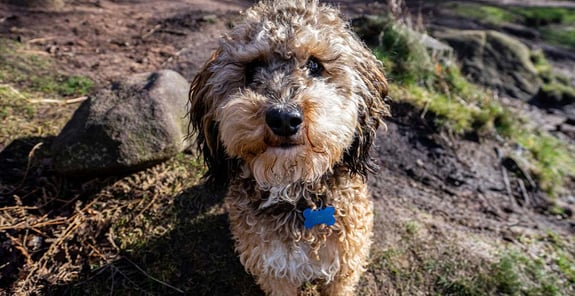

Here's an overview of the typical size ranges for each:
Toy Cockapoo: Toy Cockapoos are the smallest size category and typically stand around 10-12 inches (25-30 cm) tall at the shoulder. They usually weigh between 2.7-5.4 kg (6-12 pounds). Toy Cockapoos are compact and suitable for apartment living or households with limited space.
Miniature Cockapoo: Miniature Cockapoos are slightly larger than toy Cockapoos but still smaller than standard Cockapoos. They typically stand around 12-15 inches (30-38 cm) tall at the shoulder and weigh between 5.4-9.1 kg (12-20 pounds). Miniature Cockapoos are versatile dogs that can adapt well to various living environments.
Standard Cockapoo: Standard Cockapoos are the largest size category and can vary more significantly in size. On average, they stand around 15-18 inches (38-46 cm) tall at the shoulder and weigh between 9.1-13.6 kg (20-30 pounds). Some larger standard Cockapoos may exceed these size ranges, especially if they have larger Poodle parents.
There are also teacup Cockapoos, which you can read about in full here.
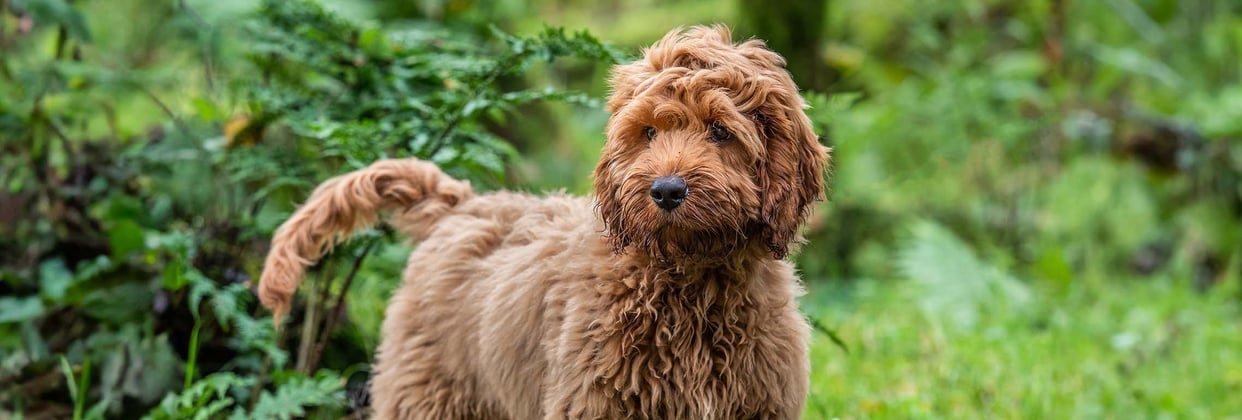

It's important to note that individual Cockapoos may fall slightly outside of these size ranges depending on various factors, including genetics and environmental influences. Breeders may also specialise in specific size ranges, so it's essential to inquire about a particular Cockapoo's expected size when considering adoption or purchase. Regular exercise, proper nutrition and veterinary care are crucial for maintaining a Cockapoo's overall health and well-being regardless of their size.
Temperament and behaviour
Temperament
Cockapoos are known for their friendly, affectionate and intelligent temperament, inheriting traits from their parent breeds, the Cocker Spaniel and the Poodle. They form strong bonds with their owners, craving attention and companionship. With their moderate to high energy levels, they enjoy regular exercise and playtime.
Cockapoos are adaptable to various living environments and thrive on being part of the family. They are loyal, playful and trainable, making them excellent companions for individuals, families, and especially first time owners who can provide them with love, attention and proper care.
Simply put, Cockapoos make fantastic pets. With their irresistible charm, boundless energy and affectionate nature, they’re known for bringing endless joy and laughter into any household. Whether cuddling on the couch, playing fetch in the park, or joining in on family adventures, Cockapoos are always eager to be by your side, wagging their tails with enthusiasm.
Their intelligence and trainability make them a pleasure to teach new tricks and commands, while their friendly demeanour makes them wonderful companions for people of all ages. If you're looking for a furry friend to brighten your days and fill your home with love, a Cockapoo is an excellent choice!
Cockapoos are excellent family dogs due to their gentle nature and adaptability. They integrate well into bustling households, enjoying the company of family members and participating in various activities. Their sociable disposition makes them ideal companions for families of all sizes, and they thrive in environments where they receive love and attention.
The Cockapoo’s playful manner makes them well-suited for interacting with children, as they’re typically gentle and tolerant. Cockapoos can form strong bonds with kids, providing companionship and joy as valued family pets.
Cockapoos tend to get along with other household pets such as cats due to their friendly and amicable nature. The downside to this is that Cockapoos are very playful which may not be entertaining for your cat, especially if they’re older. The best thing to do is to socialise your Cockapoo puppy with other pets as early as possible so that they can live side by side together without any problems.
Some Cockapoos can have a particularly strong prey drive that hails from their ancestry as hunting and working dogs. The good news is that this can be managed when they’re puppies allowing them to co-exist with smaller pets. Never leave your Cockapoo unsupervised and watch that they’re not playing too rough with any other pets that are smaller than themselves.
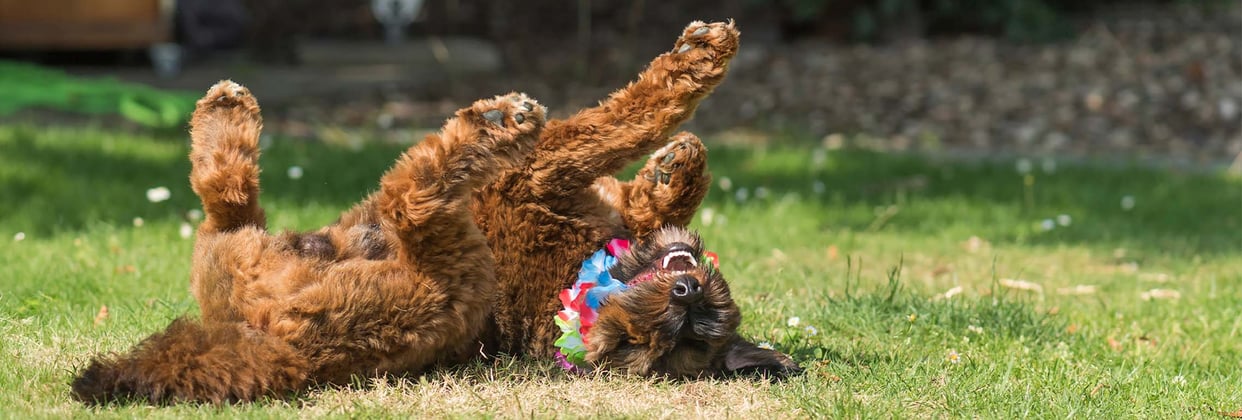

Behaviour
In general, Cockapoos are considered well-behaved dogs. They’re known for their intelligent and friendly nature and thrive on social interaction - often forming strong bonds with their owners. However, they may exhibit behaviours such as separation anxiety if left alone for too long and they can be prone to issues like predatory hunting instincts and possessiveness.
Cockapoos can also suffer from a condition known as Cockapoo rage syndrome. This causes them to have sudden aggressive behaviour. Luckily, It is a rare issue and our guide to Cockapoo rage syndrome covers this extensively.
With proper training and socialisation, Cockapoos can be well-behaved companions, but they require consistent attention and mental stimulation to prevent boredom-related behaviours.
Cockapoos can indeed suffer from separation anxiety. Being highly social dogs, they form strong attachments to their owners and may become distressed when left alone for extended periods. Symptoms of separation anxiety in Cockapoos can include excessive barking, destructive behaviour, pacing, panting and even attempts to escape.
As a Cockapoo owner, it’s important to address separation anxiety through proper training, gradual desensitisation to being alone and by providing mental stimulation and enrichment when you are apart from your canine companion.
Cockapoos, like many other breeds, can be left alone for short periods, but they generally prefer not to be alone for extended periods. They are social dogs that enjoy being around people and can experience separation anxiety if left alone for too long.
Cockapoos can adapt well to apartment living, provided they receive enough exercise, mental stimulation and attention from their owners! Their small to medium size makes them suitable for an apartment environment but they still require regular walks and playtime to stay healthy and happy.
Cockapoos are generally well-behaved indoors, making them suitable companions for apartment dwellers. However, it's essential to ensure that they have access to outdoor areas for bathroom breaks and exercise.
Cockapoos are generally considered to be relatively quiet dogs and are not known to be excessive barkers. However, they may bark to alert their owners to perceived threats or changes in their environment. Cockapoos are intelligent dogs and can be trained to bark less through positive reinforcement training techniques. Providing mental stimulation, exercise and lots of attention can also help reduce any potential barking behaviour.
Training a Cockapoo
Training a Cockapoo is vital for cultivating good behaviour and ensuring they become well-adjusted companions. Begin early using positive reinforcement techniques like treats and praise to encourage desired behaviours consistently. Socialisation from a young age helps prevent fearfulness and aggression whilst teaching basic commands like sit, stay and come helps to establish obedience.
Are Cockapoos smart?
Cockapoos are generally considered to be intelligent dogs. They inherit intelligence from both of their parent breeds, the Cocker Spaniel and the Poodle, both of which are known for their intelligence and trainability. Cockapoos often excel in learning commands and tricks, and they are quick to pick up on new behaviours and tasks. Their intelligence, combined with their friendly and eager-to-please nature, makes them relatively easy to train and enjoyable to work with.
Are Cockapoos easy to train?
Yes! Cockapoos are clever dogs that are eager to please their owners, which makes them responsive to training efforts. Cockapoos typically excel in learning basic obedience commands and are quick learners when it comes to new tricks and behaviours.
Positive reinforcement techniques, such as treats, praise and rewards work well with Cockapoos and can help reinforce desired behaviours effectively. Consistency, patience and regular training sessions are key to successfully training a Cockapoo, but their intelligence and willingness to learn make the process relatively smooth for most owners.
Shedding and grooming
Cockapoos typically have minimal shedding but require regular grooming to maintain their coat's health and prevent matting.
How often should I brush my Cockapoo?
The frequency of brushing your Cockapoo depends on their coat type and length, but we recommend brushing at least 2-3 times a week to prevent matting. Regular brushing also helps to remove loose hair and distributes natural oils throughout the coat. If your Cockapoo has a longer or curly coat, daily brushing may be necessary to keep it tangle-free. Regular brushing helps to reduce shedding and keeps your dog's coat looking healthy and shiny. You can adjust the brushing frequency based on your Cockapoo's individual needs and the condition of their coat.
How often should I bathe my Cockapoo?
Cockapoos generally benefit from bathing every 4-6 weeks or as needed, depending on their activity level and how dirty they get. Over-bathing can strip their coat of natural oils, leading to dry skin and potential irritation, so it's essential to strike the perfect balance.
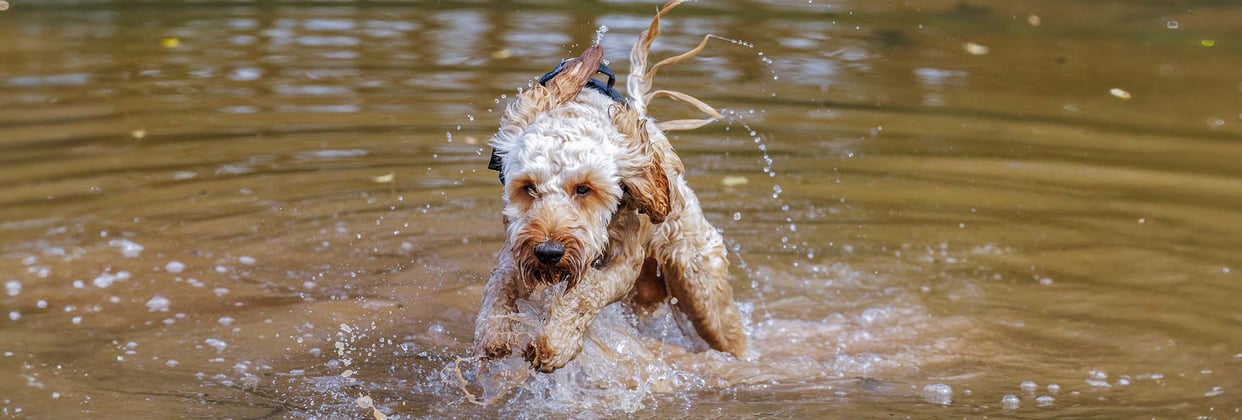

If your Cockapoo spends a lot of time outdoors or gets particularly dirty, you may need to bathe them more frequently. However, always use a mild dog shampoo to avoid drying out their skin and coat, and ensure thorough rinsing to prevent any residue buildup.
How often should I cut my Cockapoo’s hair?
The frequency of haircuts for your Cockapoo depends on the desired length of their coat and how fast their hair grows. Generally, Cockapoos benefit from a professional grooming session every 4-6 weeks to keep their coat trimmed and tidy. However, if you prefer a longer coat or if your Cockapoo's hair grows quickly, you may need more frequent grooming sessions to maintain their desired look and prevent matting.
Regular grooming not only keeps your Cockapoo looking neat but also helps to ensure their coat remains healthy and manageable. Adjust the haircut schedule based on your Cockapoo's individual needs and the style you prefer for their coat.
Do Cockapoos shed?
Cockapoos typically shed very minimally, if at all. This trait often stems from their Poodle parentage, as Poodles are known for being low-shedding dogs. However, it's essential to note that individual Cockapoos may exhibit varying degrees of shedding depending on their genetics and the specific traits they inherit from their Cocker Spaniel and Poodle parents. Generally, Cockapoos are considered a great hypoallergenic option for people with allergies or those who prefer a dog with minimal shedding. Regular grooming can also help to further minimise any shedding that may occur.
Though Cockapoos are considered hypoallergenic, it's important to understand what that term means. "Hypoallergenic" doesn't mean that a dog won't trigger allergies at all; rather, it means they're less likely to cause allergic reactions in people who are sensitive to pet dander.
Nails and trimming
The frequency of trimming your Cockapoo's nails depends on various factors including their activity level, the surface they walk on and their individual nail growth rate. In general, most Cockapoos require nail trimming every 4-6 weeks.
Nails and trimming
The frequency of trimming your Cockapoo's nails depends on various factors including their activity level, the surface they walk on and their individual nail growth rate. In general, most Cockapoos require nail trimming every 4-6 weeks.


However, some may need it more frequently if their nails grow quickly or if they don't naturally wear down their nails through activities like regular walks on hard surfaces.
Regularly checking your Cockapoo's nails for signs of overgrowth, such as clicking sounds when they walk or nails that touch the ground, can help you determine when they need trimming. Keeping their nails at an appropriate length is essential for their comfort and mobility, as excessively long nails can cause discomfort and even affect their gait and posture.
Exercise needs
Exercising a Cockapoo is essential for their physical health and mental well-being. As active dogs, they enjoy various activities so aim for a mix of physical exercise and mental stimulation to keep them happy and healthy. Cockapoos benefit from daily walks or play sessions, allowing them to burn off energy and explore their surroundings. Consider incorporating obedience training or agility exercises to challenge their intelligence and keep them mentally sharp. Be mindful of your Cockapoo's individual needs, considering factors like age, health and energy level when planning their exercise routine. Providing opportunities for socialisation with other dogs will help to prevent boredom and aid your dog in becoming confident and well-socialised. Regular exercise not only keeps Cockapoos physically fit but also strengthens the bond between you and your furry friend.
How much exercise does a Cockapoo need?
Cockapoos typically need about 30 minutes to an hour of exercise each day to maintain their physical health and mental well-being. This exercise can take various forms, including walks, playtime, interactive games and training sessions.
However, the specific amount of exercise required may vary depending on factors such as age, health, individual energy levels and temperament. Younger and more energetic Cockapoos may benefit from more vigorous exercise, while older or less active dogs may require gentler activities.
It's essential to observe your Cockapoo's behaviour and adjust their exercise routine accordingly to ensure they remain happy, healthy and well-balanced. Regular exercise will not only help to keep your Cockapoo physically fit but also stimulates their mind and strengthens the bond you share.





Playtime and mental stimulation
Cockapoos thrive on mental stimulation and playtime, which are crucial for their overall well-being. These intelligent and social dogs enjoy engaging in various activities that challenge their minds and keep them entertained. Interactive games, such as hide-and-seek, puzzle toys and treat-dispensing toys provide mental stimulation while also satisfying their natural curiosity.
Training sessions are another excellent way to engage Cockapoos mentally, as they enjoy learning new commands and tricks. Incorporating regular playtime games such as fetch, tug-of-war, or agility exercises can help to burn off excess energy
Feeding and nutrition
Cockapoos require a balanced diet consisting of high-quality protein, moderate fat content, easily digestible carbohydrates and essential vitamins and minerals. Protein sources like chicken, beef, fish, or lamb are crucial for muscle and tissue health, while healthy fats from sources like chicken fat, fish oil, or flaxseed oil support skin and coat health. Carbohydrates such as rice, oats, barley, or sweet potatoes also work to provide energy.
Always ensure your pup’s diet includes vital nutrients like vitamin A, vitamin D, vitamin E, calcium, phosphorus, and omega-3 fatty acids. And don’t forget - always provide fresh water for hydration.
How much food should a Cockapoo eat?
When it comes to feeding your Cockapoo, it's essential to monitor portion sizes to maintain a healthy weight. The amount of food a Cockapoo should eat depends on factors such as age, size, activity level and metabolism - but a general guideline is to feed them around 1/4 to 3/4 cups of high-quality dog food per day, divided into two meals. High-quality dog food refers to food with real meat as the main ingredient and that is free from artificial fillers and additives.
Puppy Cockapoos have different nutritional requirements to adults, and therefore you should follow the feeding guidelines as indicated on your chosen puppy food packaging. It’s important to monitor your dog's weight and adjust portion sizes accordingly to prevent overfeeding or underfeeding. Always provide fresh water and for personalised advice on your Cockapoo's diet, consult with your veterinarian.
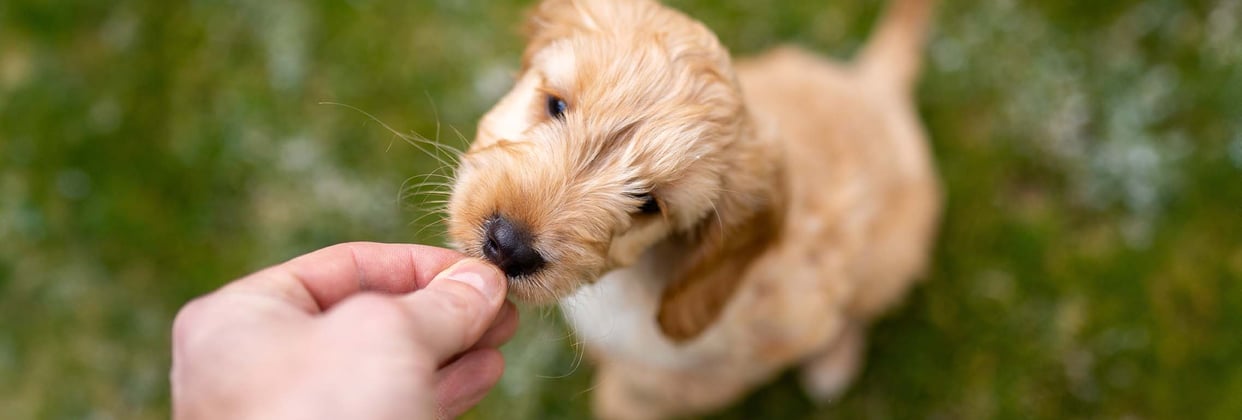

When it comes to deciding what to feed your new addition, the good news is that you’ve got plenty of options. Some owners opt for raw food whereas others prefer a more tailored mix of cooked meat, like that provided by Butternut Box, one of our reward partners.
Butternut Box provides freshly-prepared, perfectly-portioned meals using human-quality meat and vegetables. By gently cooking their food to create simple, tasty, and complete meals, Butternut Box achieves the right balance of vitamins and minerals for dogs of every age. Best of all, Waggel members get 40% off their first two boxes!
If your pup prefers kibble to wet food, why not grab a bag for free with Tails.com? You’ll also get 50% off your entire order with them. (Again, this offer is only available for Waggel customers.)
It's important to follow the feeding recommendations on the dog food packaging and consult your veterinarian for precise guidance tailored to your Cockapoo’s needs, especially if they are on a fresh, wet, or raw diet. Adjust the portion size based on your dog's weight and body condition to maintain a healthy weight.
Cockapoo common health issues
Cockapoos are generally healthy dogs and have an expected lifespan of around 12 to 15 years. Like any dog breed, they’re prone to certain health issues such as hip dysplasia, progressive retinal atrophy and allergies - all of which we’ll touch upon below.
To help you gain a better understanding of the health conditions, treatment and insurance claims associated with Cockapoos, we’ve compiled the following list with information from the years 2022 to 2023.
Luxating patella: Cockapoos can experience a luxating patella, a condition where the kneecap dislocates from its normal position, causing discomfort and lameness. Depending on the complexity of the procedure and the veterinary clinic’s pricing structure you could be looking at treatment costs of around £1,000 to £4,000.
Hip dysplasia: This condition involves an abnormal development of the hip joint, which can lead to arthritis and mobility problems. Treatment for hip dysplasia can range from weight management and physical therapy to surgical procedures like hip replacement, with costs in the UK averaging between £1,500 to £4,000.
Progressive retinal atrophy (PRA): PRA is an inherited eye disorder that can result in gradual vision loss and eventual blindness. For diagnostic procedures, such as veterinary consultations, specialised eye exams and genetic testing, you might expect to pay around £80 to £200 or more.
Treatment options for managing PRA may include dietary supplements or antioxidants, which could cost approximately £15 to £70 or more per month. In cases where advanced treatments like cataract surgery are required costs can be significantly higher - ranging from £1,000 to £2,500 or more per eye.


Corneal ulcerations: Cockapoos can be susceptible to corneal ulcers, which are painful sores on the surface of the eye. Treatment options for corneal ulcers may include topical medications such as antibiotics, anti-inflammatory drugs and lubricating eye drops. The cost of these medications can vary depending on the type, dosage and duration of treatment. You might expect to pay around £20 to £100 or more for a course of topical medications.
In more severe cases or if the ulcer fails to heal with medical management, additional treatments such as surgical procedures (e.g., corneal debridement, conjunctival grafting) may be necessary. These procedures can be more expensive, ranging from £500 to £2,000 or more depending on the complexity of the surgery and the need for anaesthesia and post-operative care.
Allergies: Some Cockapoos may suffer from allergies, which can manifest as skin problems, itching and discomfort. The diagnostic procedures for allergies in Cockapoos may include veterinary consultations, allergy testing (either through intradermal or blood tests) and possibly trial elimination diets or skin biopsies, with costs typically ranging from £100 to £500.
Treatment options for allergies in Cockapoos may involve medications like antihistamines, corticosteroids or allergy shots (immunotherapy), specialised hypoallergenic diets and topical treatments like shampoos or sprays. The costs associated with these treatments can vary depending on factors such as the type, dosage and length of treatment ranging from £20 to £300 or more per month, depending on the specific needs of the dog and the severity of the allergies.
These are approximate figures and can change over time due to inflation and developments in veterinary care practices. Though the above treatment prices can seem costly, pet insurance provides financial coverage for a portion of your pet’s medical expenses - a portion you can set yourself! By paying a regular premium, you can ensure that you have financial support when unexpected veterinary bills arise.
Waggel Pet Insurance provides peace of mind and Lifetime protection against a range of potential health issues, including conditions like cataracts, luxating patellas, and more. With Waggel, you can rest assured that your pet's health concerns are financially supported, allowing you to focus on what’s most important; being the best pet parent possible.
Pet insurance for Cockapoos
If you’re considering getting a Cockapoo puppy, you’re probably already familiar with pet insurance. But do you know just how essential it is? Long story short, Waggel Pet Insurance ensures that your new companion receives the best possible care without financial worries.
Though we’d hate for it to happen, unexpected illnesses and accidents can occur at any time. However, at Waggel we provide peace of mind, allowing you to make decisions based on your pet's well-being rather than cost. To explore coverage options tailored to your pet's needs, get a free quote today.
As a Waggel member, you’ll also get exclusive access to our membership platform. Here you can find Joii, a 24/7 online vet care provider connecting you to a vet whenever you need help. You’ll also be able to book behaviour and nutrition consultations entirely free of charge with Junior Hudson, a holistic canine wellness expert from Companion Animal Wellness.
However, it doesn’t just stop there. You’ll also receive personalised perks, discounts and deals every month to suit both you and your new addition. What’s not to love?
